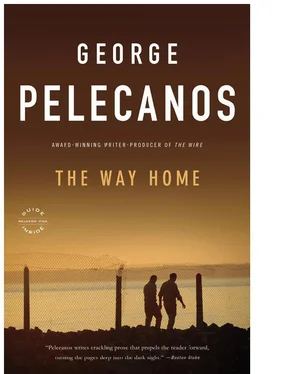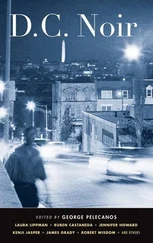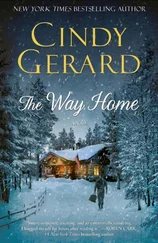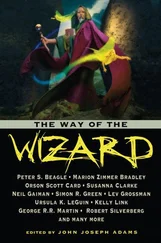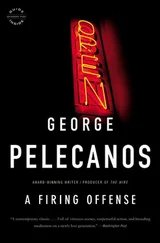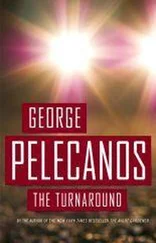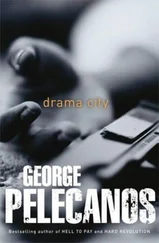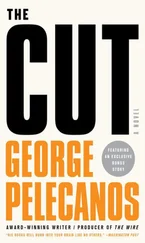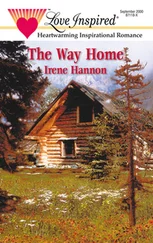George Pelecanos - The Way Home
Здесь есть возможность читать онлайн «George Pelecanos - The Way Home» весь текст электронной книги совершенно бесплатно (целиком полную версию без сокращений). В некоторых случаях можно слушать аудио, скачать через торрент в формате fb2 и присутствует краткое содержание. Жанр: Криминальный детектив, на английском языке. Описание произведения, (предисловие) а так же отзывы посетителей доступны на портале библиотеки ЛибКат.
- Название:The Way Home
- Автор:
- Жанр:
- Год:неизвестен
- ISBN:нет данных
- Рейтинг книги:4 / 5. Голосов: 1
-
Избранное:Добавить в избранное
- Отзывы:
-
Ваша оценка:
- 80
- 1
- 2
- 3
- 4
- 5
The Way Home: краткое содержание, описание и аннотация
Предлагаем к чтению аннотацию, описание, краткое содержание или предисловие (зависит от того, что написал сам автор книги «The Way Home»). Если вы не нашли необходимую информацию о книге — напишите в комментариях, мы постараемся отыскать её.
The Way Home — читать онлайн бесплатно полную книгу (весь текст) целиком
Ниже представлен текст книги, разбитый по страницам. Система сохранения места последней прочитанной страницы, позволяет с удобством читать онлайн бесплатно книгу «The Way Home», без необходимости каждый раз заново искать на чём Вы остановились. Поставьте закладку, и сможете в любой момент перейти на страницу, на которой закончили чтение.
Интервал:
Закладка:
Many of the boys sat slumped in their chairs, some with their arms crossed, some looking away from the teacher, a couple with their eyes closed, stealing sleep. Understandable, as the most blatantly inattentive of them could neither read nor write. Ali, by far the smartest boy in the class, understood what Mr. Beige was saying, but the majority of the other boys did not. Just as many did not have any interest in the subject matter and felt that it had no relevance to the reality of their lives. All of this stuff with Dr. King and Lonnie’s Big Johnson had happened before they were born, and wasn’t no Dr. Anyone coming to save them and pull them up out of this jail.
“… Ironically, it was Lyndon Johnson, a product of the South and its racist environment, who signed the Civil Rights Act of 1964, which gave all citizens in this country, regardless of their color, the right to vote.”
“He was a leader,” said Chris, not intending to speak but recalling something his father had said about Johnson at the dinner table one night. His old man was a history buff. The living room of their home was full of books on presidents and war.
“Black folk couldn’t vote before then?” said Ben Braswell, a big dark-skinned boy with soulful eyes who lived in Chris’s unit. Ben had stolen many cars and had been caught one too many times.
“Until then,” said Mr. Brown, “some white people in power found loopholes and obstacles to prevent African Americans from participating in the process. The Civil Rights Act made any kind of racial discrimination illegal.”
“What you think about that, White Boy?” said a husky voice behind Chris.
Chris did not turn his head, knowing that it was Lawrence Newhouse, who some called Bughouse, doing the talking. He did not feel threatened by Lawrence, nor slighted by the tag, which had been given to him his first day in. Everyone had another name in here, the same way soldiers did on the battlefield, and White Boy, though a supremely uncreative moniker, was as good as any other. Lawrence was stupid running to illiterate, unnecessarily abrasive at times, but not considered dangerous unless he was off his meds, though everyone knew he had shot a boy on Wade Road, which had been his ticket in. He was thin and had almond-shaped eyes and skin that in certain lights looked yellow.
“Asked you a question,” said Lawrence.
Chris shrugged, the rise and fall of his shoulders his response.
“What, you can’t speak?”
“You mind?” said Ali, turning his head to glare at Lawrence. “I’m tryin to hear this shit.”
Ali had no intention of defending Chris, but Lawrence annoyed him. Plus, there was that old thing between them. Ali had grown up in Barry Farms, a Section 8 complex in Southeast, and Lawrence had come up in the Parkchester Apartments, a neighboring housing unit. Neither of them were crew members, but there was a rivalry between the young men of the dwellings, a long-standing beef that no one, if pressed, could dissect or explain. Nonetheless, Ali Carter and Lawrence Newhouse had been assigned to the same unit. Boys with a history of animosity, gang related or otherwise, were mixed in with one another and were expected to work out their differences.
“I say somethin to you, Holly?” said Lawrence.
“My name is Ali. ”
“There a problem?” said the old man, Lattimer.
“I’m about to see you outside, little man,” said Lawrence under his breath.
But instead, when the class was done and the boys filed out, Lawrence Newhouse took a wild swing at a guard for no apparent reason and was subdued by several other guards and hustled down the hall into an empty room, from which the boys could hear shouts and sounds of struggle. The next time the boys from Unit 5 saw Lawrence, just before lockdown that night, his cheek and upper lip were swollen. He and Ali passed each other in the recreation room but said nothing and made no hard eye contact. A couple of the young men, who did not particularly care for Lawrence, dapped him up. Fights between inmates were inevitable and sometimes necessary, but they bought you nothing. When you swung on a guard, you were going to take a beatdown for sure, but you earned a little piece of respect. Even from your enemies.
Chris had been inside for several weeks and had been in no fights yet. He had been the recipient of many shoulder bumps and hard brushes, and given out a few, but they had come to nothing. As for his color, he absorbed the usual comments and chose not to respond. Truth was, it didn’t bother him to be described as a cracker. Had he called someone a nigger, there would have been immediate go, but there was no corresponding word for whites that would automatically start a fight. Because of Chris’s indifference, the other young men grew tired of using his race as a launching pad for aggression and dropped it.
Not that he was feared. He was on the big and strong side, but this did not deter anyone. In fact, it made the smaller boys more eager to drop him. But the deliberate bumps were perfunctory and did not escalate to anything approaching real violence.
The nature of Chris’s crimes gave him a certain mystique that was useful on the inside. He was the crazy white boy who had cold-cocked a kid for no reason, led the police on a high-speed chase, and outrun them. When asked, Chris told the story true, but in its telling it did sound as if he had no regard for consequences or respect for the law, when in fact, on the night in question he had just acted impulsively. Chris believed it was wise to take this rep as a gift and did nothing to dispel the notion that he was a little bit off.
The other thing that served him well was his ability to play and sometimes excel at basketball. The Pine Ridge half court, out in the field, was an asphalt surface land-mined with fissures and weeds, equipped with a slightly bent rim with chain netting. The rim was unforgiving, but once Chris learned its idiosyncrasies, he was good with it, and word quickly got around that he could ball. At first he wasn’t chosen for pickup because of his color, but the guards forced the issue, and soon he was out there, getting hacked and bumped like everyone else. Playing those games on Saturday afternoons, and holding the court and bragging rights with what would become his team, which included the tall and athletically gifted Ben Braswell, was the high point of his week.
There were no other peaks. The boys were indoors most of the time, and the atmosphere in the unit buildings fostered depression. With clouded Plexiglas substituting for glass, little light entered the structures, so even on sunny days, their world seemed gray, colorless, and grim.
By design, the boys did not have a say in the rules or conditions at Pine Ridge. There was no suggestion box. The boys took orders or they didn’t. They were ordered to go from one place to another, to keep in line, to get out of bed, to get in and out of the showers, to get to the cafeteria and to leave the cafeteria, to hurry into class and to leave class, to move into their cells. The guards didn’t ask. They shouted and they commanded, often with obscenity-laced language.
Chris found himself bored with the sameness of his life inside. He was smart enough to know that he was being punished, that the boredom, the attitude of the guards, the tasteless food, the scratchy old blanket on his cot, all of it was intended to make him want to act right so he could be released and not return. But still, the treatment and surroundings didn’t have to be so harsh all the time. The boys got it, they knew they weren’t on some field trip, but it seemed counterproductive to get shit on day after day. After a while, the way they got treated felt less like punishment and more like cruelty.
So with bitterness they acted out and broke rules. They talked out of turn in class and swung on guards and one another. Many smoked marijuana when they could get it. It was brought in by a guard who walked it through the gatehouse by taping it under his balls, and it got paid for by money the boys’ relatives gave them on visiting days. The weed, stashed in ceiling tiles, was occasionally potent but frequently was not, and most times it produced headaches over highs, but it was something to do.
Читать дальшеИнтервал:
Закладка:
Похожие книги на «The Way Home»
Представляем Вашему вниманию похожие книги на «The Way Home» списком для выбора. Мы отобрали схожую по названию и смыслу литературу в надежде предоставить читателям больше вариантов отыскать новые, интересные, ещё непрочитанные произведения.
Обсуждение, отзывы о книге «The Way Home» и просто собственные мнения читателей. Оставьте ваши комментарии, напишите, что Вы думаете о произведении, его смысле или главных героях. Укажите что конкретно понравилось, а что нет, и почему Вы так считаете.
